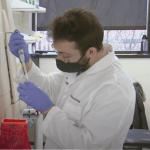Gaurav Varshney, Ph.D.
Associate Professor
Genes & Human Disease Research Program
My 101
My research focuses on understanding the genetic causes of human diseases, particularly those affecting the brain and hearing. We use zebrafish as a model organism because of their genetic and developmental similarities to humans. We have developed advanced tools based on CRISPR, a revolutionary gene-editing technology, to precisely manipulate the DNA of zebrafish. This allows us to replicate genetic changes found in human patients and study their impact on disease development.
We are especially interested in hearing loss and neurological conditions such as intellectual disability and seizures. By studying zebrafish with these genetic alterations, we can uncover how mutations disrupt normal development and function. This knowledge can help us identify new therapeutic targets for treating these conditions in humans.
A key aspect of our research involves developing new tools to enhance the efficiency and accuracy of gene editing. By improving these tools, we can better understand the effects of different genetic changes on health and disease. For example, we have created improved CRISPR tools that can target more regions of the genome with greater precision, enabling more effective study of genetic diseases.
We have also developed a faster method to observe the effects of genetic modifications in zebrafish. Instead of waiting months for results, our method allows us to observe changes within days. This accelerated timeline helps us quickly identify genes involved in various diseases, particularly those affecting hearing and brain function.
Our research also focuses on understanding the role of non-coding DNA, the parts of our DNA that don't directly code for proteins. These regions can still influence gene regulation, and changes in these regions have been linked to various diseases. We are using zebrafish to study how these non-coding changes contribute to diseases like hearing loss.
In summary, our work utilizes cutting-edge gene-editing technology to investigate the genetic basis of diseases, with the goal of improving understanding and treatment of genetic disorders, especially those affecting hearing and brain function.
Research
Our lab focuses on the development and optimization of advanced CRISPR-based genome editing methods. We are at the forefront of creating highly efficient base editors and expanding the CRISPR toolkit to enhance the functional analysis of genetic variants.
We delve into the mechanistic insights of novel candidate genes associated with a range of neurological and neurodevelopmental disorders, as well as hearing impairments. Our research aims to elucidate the genetic underpinnings and pathogenic mechanisms, facilitating the development of therapeutic interventions.
Our lab is pioneering methods to explore the functional implications of non-coding variants identified through genome-wide association studies (GWAS). This research aims to uncover the regulatory roles of these variants and their contributions to complex human diseases.
Brief CV
Education
M.Sc., GB Pant University of Agriculture & Technology, Pantnagar, India, 1999
Ph.D., Umeå University, Umeå, Sweden, 2008
Postdoc, (Mentor: Shawn Burgess) National Human Genome Research Institute, National Institutes of Health, Bethesda, MD, 2009-2016
Honors and Awards
Junior Faculty Award for Excellence, Zebrafish Disease Model Society, 2022
J. Donald & Patricia H. Capra Award for Scientific Achievement, OMRF, 2022
Genome Recognition of Employee Accomplishments and Talents Award, NHGRI/NIH, 2016
DeLill Nasser Award for Professional Development in Genetics, Genetics Society of America, 2016
National Human Genome Research Institute (NHGRI) Intramural Research Trainee Award, 2014
NIH Fellows Award for Research Excellence, 2014
NIH Fellows Award for Research Excellence, 2012
Genome Recognition of Employee Accomplishments and Talents Award, NHGRI/NIH, 2012
Joined OMRF's scientific staff in 2017
Publications
Recent Publications
Qin W, Lin SJ, Zhang Y, Huang K, Petree C, Varshney P, Varshney GK. High-efficiency TadA cytosine base editors for precise modelling of human disease variants. Nat Biomed Eng, 2026 January, PMID: 41606292
Owrang D, Rad A, Alerasool M, Kolb SM, Lin SJ, Doll J, Alidadiani N, Ghaderi S, Hofrichter MAH, Maroofian R, Varshney GK, Mojarrad M, Bartsch O, Haaf T, Vona B. Expansion of Molecular and Clinical Aspects of EPS8L2 (DFNB106)-Associated Hearing Loss Emphasizes a Potential Therapeutic Window. Mol Neurobiol 63:354, 2026 January, PMID: 41514136, PMCID: PMC12789209
Owrang D, Rad A, Cretu C, Lin SJ, Mustafa HM, Huang K, Waheed N, Hussain M, Riaz S, Preobraschenski J, Varshney GK, Oprea G, Vona B. Uncovering Dual Molecular Diagnoses in Families with Complex Phenotypes through Structural and Clinical Study of Novel COL4A6 Variants. QJM, 2025 October, PMID: 41092388
Selected Publications
Varshney GK, Carrington B, Pei W, Bishop K, Chen Z, Fan C, Xu L, Jones M, LaFave MC, Ledin J, Sood R, Burgess SM. A high-throughput functional genomics workflow based on CRISPR/Cas9-mediated targeted mutagenesis in zebrafish. Nat Protoc. 2016 Dec;11(12):2357-75. PMID: 27809318 PMID: 27809318
Varshney GK, Burgess SM. DNA-guided genome editing using structure-guided endonucleases. Genome Biol. 2016 Sep 15;17(1):187. PMID: 27640875 PMCID: PMC5025577
Pei W, Xu L, Varshney GK, Carrington B, Bishop K, Jones M, Huang SC, Idol J, Pretorius PR, Beirl A, Schimmenti LA, Kindt KS, Sood R, Burgess SM. Additive reductions in zebrafish PRPS1 activity result in a spectrum of deficiencies modeling several human PRPS1-associated diseases. Sci Rep. 2016 Jul18;6:29946. PMID: 27425195 PMCID: PMC4947902
Carrington B, Varshney GK, Burgess SM, Sood R. CRISPR-STAT: an easy and reliable PCR-based method to evaluate target-specific sgRNA activity. Nucleic Acids Res. 2015 Dec 15;43(22):e157. PMID: 26253739 PMCID: PMC4678847
Varshney GK, Zhang S, Pei W, Adomako-Ankomah A, Fohtung J, Schaffer K, Carrington B, Maskeri A, Slevin C, Wolfsberg T, Ledin J, Sood R, Burgess SM. CRISPRz: A database of validated sgRNAs in zebrafish, Nucleic Acids Research Oct. 4, 2015. PMID: 26048245 PMCID: PMC4484386
Varshney GK, Pei W, LaFave MC, Idol J, Xu L, Gallardo V, Carrington B, Bishop K, Jones M, Li M, Harper U, Huang SC, Prakash A, Chen W, Sood R, Ledin J, Burgess SM. High-throughput gene targeting and phenotyping in zebrafish using CRISPR/Cas9. Genome Res. 2015 Jul;25(7):1030-42. PMID: 26048245 PMCID: PMC4484386
Contact
Genes & Human Disease, MS 42
Oklahoma Medical Research Foundation
825 N.E. 13th Street
Oklahoma City, OK 73104
Phone: (405) 271-2185
Fax: (405) 271-3765
E-mail: gaurav-varshney@omrf.org
For media inquiries, please contact OMRF’s Office of Public Affairs at news@omrf.org.
Lab Staff
Wei Qin, Ph.D.
Associate Staff Scientist
Cassidy Petree
Research Technician II
Yu Zhang
Research Technician I
Lena "Ruth" Clark
Laboratory Technician
Susan "Suzy" Collins
Project Coordinator II
News from the Varshney lab

When Dr. Gaurav Varshney arrived at OMRF in late 2016, the first things he purchased for his new research program were fish tanks. Lots of them. During a seven-year post-doctoral fellowship at the National Institutes of Health in Bethesda, Md., Varshney developed an expertise in studying developmental biology in paperclip-sized aquatic creatures known as zebrafish. […]














